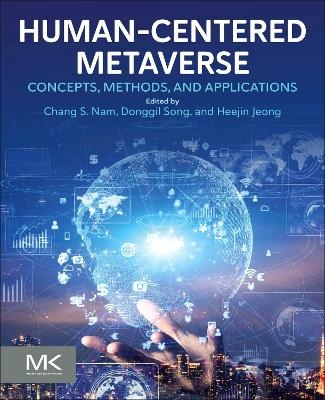
Human-Centered Metaverse
Morgan Kaufmann Publishers In (Verlag)
978-0-443-21996-2 (ISBN)
Chang S. Nam is currently a Professor of Industrial and Systems Engineering at North Carolina State University (NCSU), USA. He is also an associated faculty in the UNC/NCSU Joint Department of Biomedical Engineering, Department of Psychology, and Brain Research Imaging Center (BRIC) at UNC. He received a PhD at Virginia Tech. His research interests center around brain-computer interfaces, computational neuroscience, neuroergonomics, and human-AI/Robot/Automation interaction. He is the editor of “Brain-Computer Interfaces Handbook: Technological and Theoretical Advances (with Drs. Nijholt and Lotte, CRC Press), “Neuroergonomics: Principles and Practices (Springer), “Mobile Brain-Body Imaging and the Neuroscience of Art, Innovation and Creativity (with Contreras-Vidal et al., Springer), “Trust in Human-Robot Interaction: Research and Applications (with Lyons, Elsevier), and “Human-centered AI: Research and Applications (with Jung & Lee, Elsevier). Currently, Nam serves as the Editor-in-Chief of the journal Brain-Computer Interfaces. Donggil Song is Associate Professor of Engineering Technology & Industrial Distribution, College of Engineering, Texas A&M University. His research lab (Einbrain Lab, www.einbrain.com) focuses on artificial intelligence (AI) engineering for human learning, human-centred AI, machine learning (ML)-based mixed-reality (MR) AI systems. His research interests are geared towards creating systems by utilising AI/ML and natural language processing while focusing on facilitating human learning. Currently, his primary research includes the applications of virtual human systems in MR environments. From a methodological standpoint, his research interest has been on the synergies and integrations between AI engineering and learning technologies research methods. He holds a Ph.D. in Instructional Systems Technology from Indiana University, an M.S. in Computer Science and Engineering, and a B.A. in Religious Studies from Seoul National University (SNU), and also completed a master’s program in Cognitive Science at SNU. Presently, he serves as the Managing Editor of The International Journal of Multiple Research Approaches. Heejin Jeong is an Assistant Professor of human systems engineering in The Polytechnic School. His primary research supports human decision-making in interactions with autonomous and intelligent systems. He seeks to apply multiple engineering methodologies (e.g., experimental, human performance modelling, and data analytics and visualisation) to addressing societal problems in human-system engineering domains including transportation, robotics, healthcare, and emerging technologies (e.g., augmented/virtual reality, artificial intelligence). His focuses include extended reality systems for occupational safety enhancement and healthcare rehabilitation training and human-robot collaboration in Industry 4.0 manufacturing systems. He received his PhD in Industrial and Operations Engineering from the University of Michigan.
PART I: Metaverse Fundamentals
1. Metaverse: Augmented reality, Lifelogging, Mirror worlds, Virtual worlds
2. History of Human-centric Metaverse
3. Standardization and specification of Metaverse
4. Criticism and concerns
PART II: Advancement in Metaverse Technology
5. Platforms and contents in Metaverse
6. Digital human in Metaverse
7. Transitions between different platforms
PART III: Applications of Human-centred Metaverse
Section A: Education and Academic Fields
8. Extended classrooms and schools
9. Simulation-based learning
10. Online conferencing
Section B: Business, Entertainment, and Sports
11. Hiring and recruitment
12. Employee training and development
13. Metaverse as new work environments
Section C: Human Factors in Metaverse
14. Measures and Assessments in Metaverse
15. Remote collaboration in Metaverse
PART IV: Culture, Ethics, and Diversity in Metaverse
16. Privacy and security issues in Metaverse
17. Diversity and equity in Metaverse
18. Ethical and philosophical consideration in the Metaverse society
PART V: Future of Work in Metaverse
19. Future technology development for seamless Metaverse experiences
20. Governance, laws, and compliances for people in Metaverse
21. Human-AI cohabitation Author Index Subject Index
| Erscheinungsdatum | 16.11.2024 |
|---|---|
| Verlagsort | San Francisco |
| Sprache | englisch |
| Maße | 191 x 235 mm |
| Gewicht | 450 g |
| Themenwelt | Informatik ► Software Entwicklung ► User Interfaces (HCI) |
| ISBN-10 | 0-443-21996-6 / 0443219966 |
| ISBN-13 | 978-0-443-21996-2 / 9780443219962 |
| Zustand | Neuware |
| Informationen gemäß Produktsicherheitsverordnung (GPSR) | |
| Haben Sie eine Frage zum Produkt? |
aus dem Bereich


